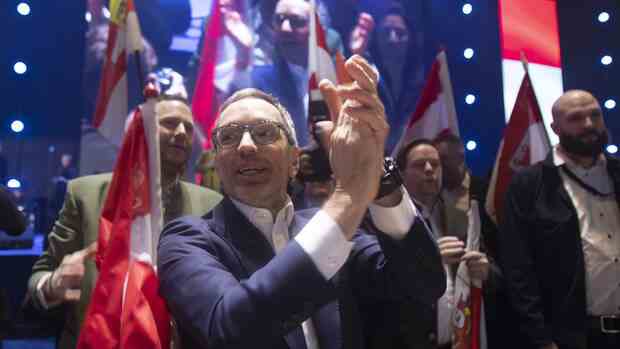Vienna Vienna would still be Vienna if there were fewer migrants in the city – with this statement Gottfried Waldhäusl from the right-wing populist FPÖ recently caused a stir in Austria.
As a member of the Lower Austrian government, Waldhäusl is a marginal figure at the national level. Nevertheless, many Austrians are outraged because Waldhäusl made his statement to high school students, some of whom come from immigrant families.
While right-wing populists are already governing or co-governing in the EU countries Italy, Hungary, Poland and Sweden, fear is once again spreading in Austria: There is FPÖ alarm – once again. This unrest always affects the political establishment when FPÖ politicians deliberately launch provocations. The excitement is particularly high this time as the party is growing significantly in elections and polls.
The new high is also a recurring phenomenon. In 2019, the FPÖ fell from 26 percent to 16 percent in the National Council election. In the elections in the state of Lower Austria a week and a half ago, she had now increased her share of the vote by more than nine percentage points to 24.2 percent. The ruling ÖVP, on the other hand, suffered a defeat – and that in its heartland. She lost almost ten percentage points and ended up at almost 40 percent.
At the national level, too, the FPÖ has risen steadily in the polls in recent months and is now at the top with around 28 percent. It was followed by the SPÖ with 24 percent and the ÖVP with 22 percent.
FPÖ benefits from Austria’s economic situation
It’s a smashing comeback, especially considering how badly the release of the “Ibiza video” damaged the party in 2019. In the secretly made recording from 2017, the then party leader and Vice Chancellor Heinz-Christian Strache promised an unknown woman who posed as the niece of a Russian oligarch, among other things, business in return for monetary donations for the FPÖ.
Heinz-Christian Strache’s talks with an alleged oligarch’s niece are said to have taken place in this house.
(Photo: imago images / Reichwein)
The FPÖ is currently benefiting from the social and economic situation in Austria. Many Austrians are worried about inflation, which at 8.6 percent is higher than the euro zone average.
As during the refugee crisis in 2015, the FPÖ managed to score points with the issue of migration. The number of asylum seekers in Austria almost tripled in 2022 compared to the previous year to 108,000.
The resentment in Austria about the high numbers is great and is also directed against some countries in southern and eastern Europe, which do not reliably register the asylum seekers.
>> Read here: Austria’s inflation in 2022 as high as it was last for the oil crisis
However, the FPÖ also gained votes due to the pandemic, as surveys after the election in Lower Austria show. The governing coalition of the conservative ÖVP and the Greens had followed an erratic corona course. She imposed several tough lockdowns and caused tension with a decided but never implemented vaccination requirement. Many people felt patronized by the government. They saw the elections in Lower Austria as an opportunity to give the ÖVP a lesson in this.
party of the individualists
Other issues are not so important to the FPÖ voters. They are relatively uninterested in the climate debate, even though it is a heated one in public. The assessment that politicians are concerned with the wrong issues is widespread, especially among FPÖ voters.
However, what is also special is how the FPÖ functions as a party, as a comparison with the ÖVP shows. This is an incredibly intricate party, says political advisor Thomas Hofer. The ÖVP consists of six sub-organizations, including for business, employees and women. It is still firmly anchored in many places in the country. If you want a good job there, you should be a member.
The FPÖ lacks such a foundation. Historically, it is an association of individualists, says a longtime political observer. That is why the renewed rise of the right-wing populists cannot be explained by the economic situation alone. The FPÖ also needs a leader who is able to absorb this mood and use it politically for the party.
The “Ibizia affair” in which Strache was involved at the time caused the party to collapse.
(Photo: Imago)
Skilled demagogues have often set the course in the FPÖ. Unlike in the ÖVP, there are no party cadres that counterbalance such leaders. The current FPÖ boss Herbert Kickl is also such a leader. For years he had worked in the background in the party, he shunned the limelight. Kickl stepped out of the shadows in autumn 2017 when the former ÖVP Chancellor Sebastian Kurz formed a coalition with the FPÖ and he became Minister of the Interior. He had to give up this office under pressure from Kurz after the “Ibiza affair”.
During the pandemic, Kickl used mass demonstrations for his appearances in which he criticized the government’s corona policy. The FPÖ boss knows that he is good at speaking and stirring things up.
Kickl wants to be chancellor
Although Kickl had long worked in the background, he now seems to have ambitions for the office of Chancellor. However, Federal President Alexander Van der Bellen has already said that if Kickl wins the election, he cannot be sure that he will be given the task of forming a government.
Some say it will not come to that anyway because the FPÖ has a tendency to self-destruction. At least the party’s past supports such a prognosis. Not only the former Vice Chancellor Strache fell deeply after the “Ibizia affair”. The legendary party president and demagogue Jörg Haider had also led the FPÖ to success 25 years ago, before internal conflicts caused the voters’ favor to plummet.
More: Austria’s President Van der Bellen sworn in for a second term
